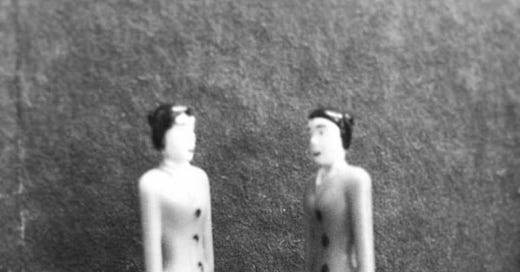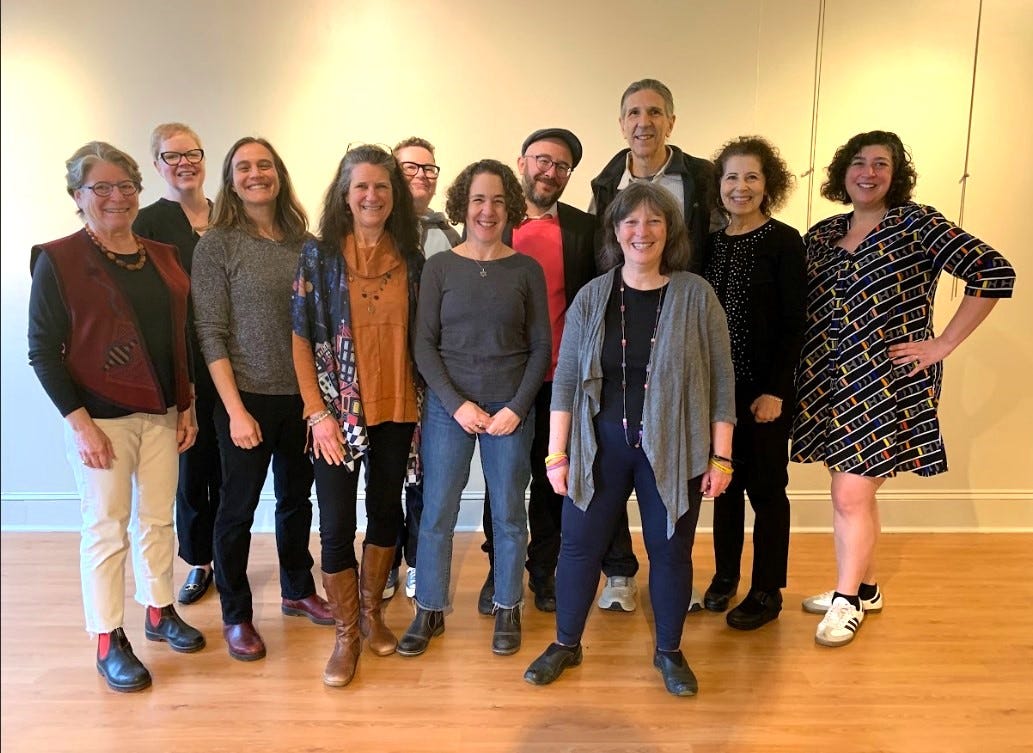Friday greetings,
I had a realization this week during a walk. It came almost as an epiphany but has since been equally elusive. I’ll do my best to recreate it here since it felt worth articulating.
It had to do with how shame and self-loathing are so ubiquitous in our culture that we might not even continue to notice their presence. It had to do with how shame and self-loathing may be a common denominator among us. How they might be the one thing that, across differences, most, if not all, Americans can relate to. And how awful that is, how much it says about what we accept as normal. It’s inescapable. And ironically, it might be the one thing that we all have in common.
Instead of including a laundry list of signifiers and identities here, I want to invite you to pause.
Better yet, grab a piece of paper and a pen, or the notes app on your phone.
Think about this:
What parts of who you are or what your life is like receive messages that you are, in a word, wrong? Can you think of one? A few? Many? What are they?
(Take your time. I’m chilling over here.)
OK, great.
What did you come up with?*
What if we compared notes?
Do you think we’d be surprised or nodding our heads?
The problem with this revelation is that it truly felt like I’d hit upon a new-to-me thought the other day, and then as soon as I tried to explain it – and now that I’m trying to convey it – it feels like it’s falling flat. I had a feeling that might happen. Then again, maybe I’m not giving myself enough credit. Maybe I’m falling prey to the very thing I’m attempting to write about!
OK, here’s another thing to play with: Next time you’re out in the world, be it in a store, in traffic, at your kid’s school, at work, in a park – basically anywhere in the presence of other humans – look around with this in mind.
In teasing out why writing into this feels so sticky and tricky, I find myself reflecting on a passage from Caste: The Origins of Our Discontents, by Isabel Wilkerson:
“Radical empathy, on the other hand, means putting in the work to educate oneself and to listen with a humble heart to understand another's experience from their perspective, not as we imagine we would feel. Radical empathy is not about you and what you think you would do in a situation you have never been in and perhaps never will. It is the kindred connection from a place of deep knowing that opens your spirit to the pain of another as they perceive it.
Empathy is no substitute for the experience itself. We don't get to tell a person with a broken leg or a bullet wound that they are not in pain. And people who have hit the caste lottery are not in a position to tell a person who has suffered under the tyranny of caste what is offensive or hurtful or demeaning to those at the bottom.”
I could not agree with these passages more. I’m also seeing a phenomenon that I’m pretty sure is related to them, which is that our society, to function optimally (which is to say, profit), requires us to feel bad about ourselves.
Who or what does this serve?
It keeps us focused on all the ways we are, in a word, wrong.
And this is where it is sticky. Because there are actual, real, impactful inequities that define our country and cause indelible, intractable harm. To ignore or diminish this would be a real misstep. And, together with this, recognizing the ubiquity and injury of shame feels somehow essential.
Like, what would happen if radical empathy, as Wilkerson describes it, was something we practiced unequivocally and universally, no matter how we might judge a person based on our superficial understanding of who we think they might be?
Maybe even more radically, and perhaps more bluntly: What if we didn’t hate ourselves? What if we didn’t hate each other?
It’s not that I’m saying you and I and everyone we know wake up in the morning feeling shame and self-loathing. (I really hope that’s not the case.)
What I am saying, though, is that I believe you would be genuinely hard-pressed to find someone who grew up in this country who has not carried some belief about themselves that some intrinsic part of who they are is simply “bad” or “wrong” or should be different or better. Who hasn’t diverted some amount of time, money, and life force towards thinking about or actively battling some aspect of who they are?
So I wonder – what would it be like if this weren’t the case?
What might we create, how might we connect, what might become possible, if we didn’t share this vocabulary of shame and self-loathing?
What would shift if we truly saw in ourselves and each other an inherent worthiness, beauty, wholeness, and rightness?
Maybe it’s simplistic or idealistic, naïve or obvious. On the other hand, even if that’s true, it cannot hurt to keep bringing this to light and addressing how it hurts us in so many ways and how unwell it is that this is a weirdly unifying force in our otherwise fractured culture.
I also think the self-awareness required for those who are either born into or come into identities or positions that equal more privilege is much more likely to grow when it’s not rooted in shame.
I want a new vocabulary for us all.
I’m honestly not sure if anything I just wrote adds up. But as is my practice, I’ll put it out there, in hopes that it sparks something of use for you and invites some reflection and/or conversation.
Also? The world wouldn’t be the same without you. True story.
Shabbat Shalom and love,
Jena
*This is an actual, not rhetorical, question. If you’re willing to share, just hit reply or leave a comment below.
Jewish Jewels: Spring Session Starts Soon
✨ Calling all Jewish writers who could use extra camaraderie, gentle accountability, and smart, supportive feedback!
✨ Focus on a specific project or a soulful desire to nourish your writing practice.
✨ Connection and encouragement can do WONDERS for your creative work!
“I actually wrote something I'd been sitting on for MONTHS… and am proud of it. The community was absolutely beautiful and so, so needed at this precise moment in time.”
~ Melissa Greenwood
Dates: - April 15-July 5Where:Asynchronous participation in a private Facebook group + two Zoom gatherings bookending our session
- Size:Limited to 12
- Cost:Three monthly payments, sliding scale $125-$300 per month
-
Have other questions?
- Drop me a note and I’ll do my very best to answer them. Also happy to chat – hop over to schedule a meet & greet.
And speaking of Jewish writers…
A Beautiful Gathering of Jewish Poets
Yesterday marked the third gathering of the Western MA chapter of Yetzirah: a hearth for Jewish poetry: Jan Freeman, Landon Godfrey, Jessica Jacobs, Tzivia Nancy Gover, M.J. Schwartz, me, Jake Marmer, Rich Michelson, Pamela Wax, Lesléa Newman, and Jen Jabaily-Blackburn.
I’m so thankful for the kindness, connection, and creativity of this community, now more than ever.
Read: Things I Haven’t Said, a new piece in the Amherst Indy (my first there in many months, which I will tell you brought on a considerable vulnerability hangover).
Appreciate this Friday Dispatch? Scan the QR code to buy me a virtual coffee!









What a lovely & thought- provoking piece, Jena. Thank you! The reflection on shame brings up so many occasions of being in circles with women and discussing what we’d like to let go of during a session or ceremony. There are so many common issues weighing us down time after time that we all carry until we have gone through enough cycles of repeated attempts to let go they will start to fade away over time. I am personally still finding the bandaids getting ripped off of issues I thought were resolved long ago, and have to keep working on them.
I loved your poem featured in the other publication, and feel very aligned with your words. Congratulations!
In closing your musings on shame brought up a piece written by author Patti Digh entitled “Your Beautiful” I would love to share with you if I can find the link. Brightest Blessings 🙏🏻🌟🪷
Thank you for this question. So interesting that the very thing I love about myself is also a source of deep-rooted shame. Almost 20 years ago I left a good-paying job and stable career path to heed the entrepreneurial voice in my head whose whispers had become a shout. I'm proud of what I've accomplished in all that time and yet it's come at significant cost (i.e. personal financial stability). There's long been a competing voice in my head with its sinister whispers about self-indulgence and the financial burden I've placed on my partner. How can I raise my children to believe they can and should follow their dreams when I struggle with shame about following my own? This, by the way, is precisely what my "self-indulgent" work has been about all these years -- working to change capitalism and financial systems toward more balanced and equitable opportunities for all, not just those who, as you say, were "either born into or come into identities or positions that equal more privilege...." If we can ever de-couple things like success, self-actualization, and abundance from purely financial measurements the world will be a very different -- much better -- place.